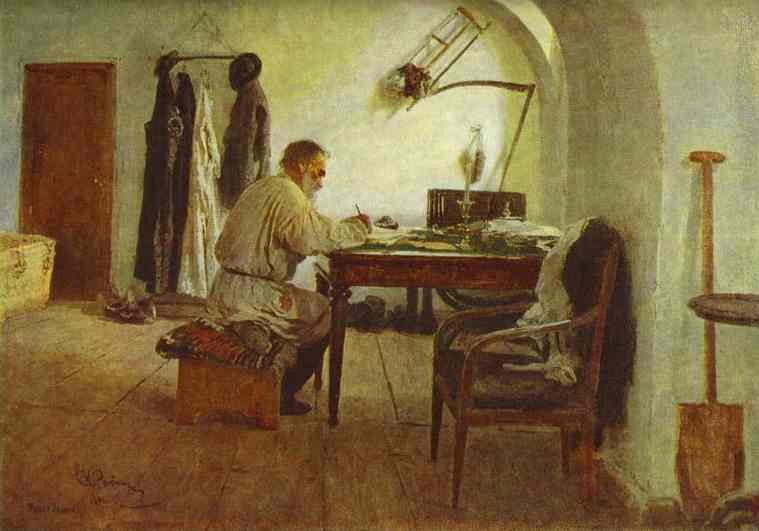I Tried Tolstoy’s Diet
What can the nourishing power of bread, water, and egomania do for you?

In honor of the discovery of Walt Whitman’s dietary tractate, here is a look at the strictly vegetarian meal plan of another nutrition-obsessed writer, Count Lev Nikolayevich Tolstoy.
Day One
In the morning, I do a little reading on Tolstoy’s dietetics. The benefit of this is twofold: first, I can learn a little bit about why I’m eating what I’m eating, and second, I can fill the time before I’m allowed to have anything at all, which isn’t until mid-afternoon. Here’s what I learn: While most of us know Leo Tolstoy as the writer of books too long to suffer through, few are aware of the contributions the prolific Russian made to the world of dieting. Yes, amid the splendor of nineteenth-century Slavic cuisine — fish eggs, pork jelly, and veal topped with béchamel sauce — Tolstoy had the gall to extoll vegetarianism. Not only did he condemn carnivorous man as inevitably inert and amoral but he said that eating too much at all was a sign of lack of self-discipline and an impious nature.
But what I want to know is: what can rigid beliefs do for one’s waistline? Tolstoy’s manifestos on vegetarianism convinced Gandhi to adopt a plant-based diet, and he eventually got a body so trim he strutted about confidently on the international stage in nothing but a loincloth. Could a staunch belief in the nourishing power of bread, water, and egomania do the same for me?
Even bread, though, I shall not have today. On day one, I am only allowed kumis, a slightly sour, mildly alcoholic yogurt drink made from fermented mare’s milk. It’s pretty hard to find, so I decided to make my own, with the help of an upstate horse farm owner, who performs the acrobatic task of milking one of his mares. I drink my first chilled glass at 2p.m. and continue sipping it until the late evening. By 9p.m. I doze off, and dream I ingratiate myself to a tribe of Steppe beekeepers, who begin to worship me.
Day Two
I wake up feeling very clear-headed, like I could write a sweeping epic or alienate myself from a major religious institution. I drink a cup of coffee made from roasted rye and eat a small bowl of gruel. For a moment, I pine for a few strips of bacon, but then I remember that Tolstoy insisted a man who ate an animal took on its characteristics, and also risked exciting carnal passions. “A man who eats too much,” he wrote in the introduction to The Ethics of Diet, “cannot strive against laziness, while a gluttonous and idle man will never he able to contend with sexual lust.” I have far too much to do to meet my word count to spend my day writhing in slop and touching myself, so I forgo the bacon.
In the afternoon, I decide to get a bit of exercise, so I drag the scythe I bought on Etsy over to Prospect Park. I begin to rhythmically swing my large blade across a swathe of unmowed grass. Just as I’m beginning to feel a bit of cardiac action, two policemen interrupt and tell me I need a permit to do any agricultural activity in a public park. As I drag my scythe toward the exit, I hear one hipster mutter to another, “Scything is the best upper arm workout.”
I eat a dinner of bread and almonds at midnight.
Day Three
Today I am fasting. Tolstoy believed that abstaining from meat eating is a step toward fasting, which is the key to living a Christ-like life and recreating the Kingdom of God here on earth. A Facebook friend suggests fasting cut also cut down my BMI over the course of one day, but I’m curiously unmoved by this comment. “Understanding the vanity of life is not so difficult, and even the simplest of people have understood it for a long time; yet they have lived and continue to live,” I replied. This garners 1,027 likes. Moralizing buoys me, and the remainder of the day I spend scribbling invectives on the spiritually corrosive nature of secular art. I contemplate finding a well-educated woman to serve as my scribe, but it seems I only have eyes for busty Cossacks these days.
Day Four
I have a dinner party. I serve soupe printaniere, a consommé of boiled celery, leek, carrot and spring onions. For hors d’oeuvres, marinated and pickled mushrooms. When my friend Cindy, who works in marketing, asks for a beer, I call her a shameless, blind animal. Cindy looks hurt, so I offer her some spring water, because it’s the Christian thing to do. When we finally sit down, I refuse to let anyone eat anything until they have listened to an hour-long diatribe on the evils of private property and women’s rights. Two friends walk out, while two others look visibly uncomfortable; Cindy offers to make me a pair of shoes from tree bark and set up a publishing house devoted to my writing alone. I consider the evening a rousing success.
Day Five
Я просыпаюсь , чтобы обнаружить Я вырос довольно длинную бороду , что странно , учитывая , что я женского пола. Я ем миску манной крупы с миндальным молоком , и немедленно принять к моей кровати с несварением желудка . Синди несет мне тринадцать детей , но я чувствую ее терпение наша жизнь здесь, в стране растет тонкий.
Day Six
To mark the end of the experiment, I eat a hamburger, and completely forget how to write Cyrillic.
Kelsey Osgood is the author of How to Disappear Completely: On Modern Anorexia. Her work has appeared at The New Yorker, Harper’s, Longreads, and other publications.